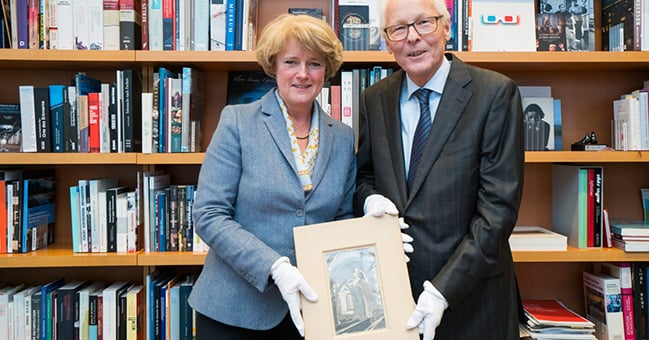
Works by Camille Pissarro and Adolph von Menzel, long hidden in the infamous art collection of Cornelius Gurlitt, have been returned to the heirs of their original Jewish owners, the Kunstmuseum Bern and the German government announced in a statement on Monday.
The works include a drawing of the interior of a Gothic church by Menzel, and a painting, View of the Seine from the Pont-Neuf, by Pissarro.
German Culture Minister Monika Grütters returned the Menzel work to the heir of Elsa Helen Cohen, who sold the piece to finance her escape to the United States in 1938 to art dealer Hildebrand Gurlitt, whose son Cornelius inherited the collection. The Pissarro painting was handed back to the heir of French-Jewish businessman Max Heilbronn a few days earlier, according to The Art Newspaper.
The Gurlitt trove includes around 1,500 artworks, with works by Pablo Picasso, Claude Monet, Paul Cézanne, Henri Matisse, Pierre-Auguste Renoir, and more. The hoard was discovered in 2012 at Gurlitt’s Munich apartment, with additional works found in 2014 at his Salzburg residency, by tax authorities.
The two works now add to the total of 4 artworks restituted from the collection, the Art Newspaper reports. The others include Max Liebermann’s Two Riders on a Beach (1901), and Henri Matisse’s Woman with a Fan (1923), from an estimated 91 works in the Gurlitt art collection thought to have been looted or sold under duress, as indicated by the research of a German government team.
The restitutions come right after an announcement that the Kunstmuseum Bern, to whom Gurlitt bequeathed the entire collection after his death in 2014, is collaborating with the Bundeskunsthalle in Bonn for a double show, “Dossier Gurlitt,” to open in November 2017. Originally planned to open in April 2016, the show was majorly delayed due to claims by Gurlitt’s family that his will was invalid due to his diminished mental capacity, which were rejected by a Munich court.
In Bern, the focus will be on “‘Degenerate Art,’ Confiscated and Sold,” while the Bonn presentation, “Nazi Art Theft and Its Consequences,” will focus on the persecution of Jewish art collectors and dealers, and the works stolen from them during World War II. The exhibitions will be on display until March 2018. Soon after, the Bonn exhibition is slated to travel to the Kunstmuseum Bern and Berlin’s Martin Gropius Bau in fall of 2018.